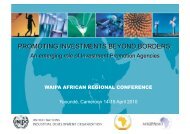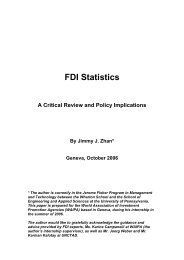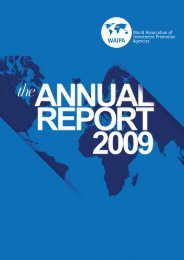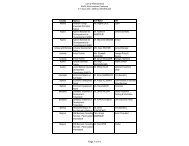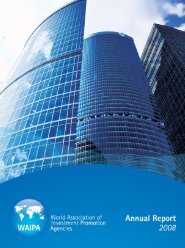Create successful ePaper yourself
Turn your PDF publications into a flip-book with our unique Google optimized e-Paper software.
<strong>WAIPA</strong> World Investment<br />
Conference <strong>2011</strong>,<br />
Geneva, Sep 5-6,<br />
<strong>2011</strong><br />
neighbouring Turkish economy. In<br />
his view, Turkey is a fast-growing<br />
economy, outside the Euro area,<br />
but with a much more diversified<br />
economy than that of Greece’s.<br />
Mr. Wolfgang added that “it is not a<br />
global crisis we are living, but rather<br />
a crisis of the West”. On a positive<br />
note, however, the Executive seemed<br />
to believe that the emergence of the<br />
BRICs, the increasing demand of<br />
their middle-classes, and the growing<br />
investments made by TNCs/MNCs<br />
based in Brazil, India and China into<br />
established markets could, along<br />
time, re-balance the global economy<br />
and, as a side-effect, help create jobs<br />
- by virtue of their investments into<br />
the West. He finished by mentioning<br />
that today India invests more in the<br />
UK, than the UK invests in India.<br />
Other panellists included BBC TV<br />
Documentary Host Leo Johnson,<br />
also co-founder of the Sustainable<br />
Finance Ltd. Mr. Johnson, by his turn,<br />
challenged the standard<br />
growth-oriented views - and, as<br />
a result, the mind-set for large<br />
FDI projects attraction – with an<br />
illustration of the scale effect (and<br />
positive impact) that adding smaller<br />
investment projects could lead to.<br />
“In the light of sustainability”, he<br />
pointed out, “the focus should shift<br />
from consumption to production<br />
and to skills-building”. First he<br />
mentioned, as example, a school in<br />
Paraguay that focused on building<br />
entrepreneurship skills, with students<br />
working on organic sugar cane along<br />
with other 17 micro-businesses.<br />
Then he complemented by citing the<br />
rural poor population in India, which<br />
did not have access to electricity,<br />
but started gasifying discarded rice<br />
husks and created mini-grids that<br />
<strong>WAIPA</strong> <strong>Report</strong> of Activities <strong>2011</strong>-2012<br />
25



